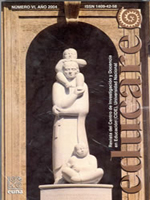Modelos gerenciales en la administración educativa
DOI:
https://doi.org/10.15359/ree.2004-6.7Abstract
Analysis of various management models that account for organizational behavior and of how these models affect—positively or negatively—the work carried out in educational institutions. The theory and its functions are defined to serve as a basis to the analysis. The paper finishes mentioning the model for the management of quality circles and how it can influence on decision-making processes at educational institutions.
References
Chiavaneto, l. ( l 990). Administración de Recursos Humanos.
Chiavaneto, I. (1992). Introducción a la Teoría de la Administración, (3ª ed.), México: Editorial Me Graw Hill.
Ishikawa, K. (1995). Qué es Control total de Calidad? Bogotá: Grupo Editorial Norma.
Owens, R.(1995). Comportamiento Organizativo en la Educación .
Sergiovanni T. (1989). Perspectivas de la Supervisión Educativa. Estados Unidos: Me Graw Hill.
UNESCO. Conferencia Mundial sobre Educación Superior (2001).
Vargas I. (2000). Documentos elaborados para el curso de Teorías de la Administración Educativa. CIDE-UNA.
Published
How to Cite
Issue
Section
License
1. In case the submitted paper is accepted for publication, the author(s) FREELY, COSTLESS, EXCLUSIVELY AND FOR AN INDEFINITE TERM transfer copyrights and patrimonial rights to Universidad Nacional (UNA, Costa Rica). For more details check the Originality Statement and Copyright Transfer Agreement
2. REUTILIZATION RIGHTS: UNA authorizes authors to use, for any purpose (among them selfarchiving or autoarchiving) and to publish in the Internet in any electronic site, the paper´'s final version, both approved and published (post print), as long as it is done with a non commercial purpose, does not generate derivates without previous consentment and recognizes both publisher's name and authorship.
3. The submission and possible publication of the paper in the Educare Electronic Journal is ruled by the Journal’s editorial policies, the institutional rules of Universidad Nacional and the laws of the Republic of Costa Rica. Additionally, any possible difference of opinion or future dispute shall be settled in accordance with the mechanisms of Alternative Dispute Resolution and the Costa Rican Jurisdiction.
4. In all cases, it is understood that the opinions issued are those of the authors and do not necessarily reflect the position and opinion of Educare, CIDE or Universidad Nacional, Costa Rica. It is also understood that, in the exercise of academic freedom, the authors have carried out a rogorous scientific-academic process of research, reflection and argumentation thar lays within the thematic scope of interest of the Journal.
5. The papers published by Educare Electronic Journal use a Creative Commons License:














 The articles published by Educare Electronic Journal can be shared with a Creative Commons License:
The articles published by Educare Electronic Journal can be shared with a Creative Commons License: 



